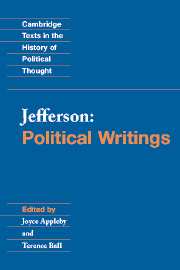Book contents
- Frontmatter
- Contents
- Preface
- Introduction
- Chronology
- Biographical synopses
- A note on sources
- Bibliographical note
- I A Private Man in Public Life
- II Natural Law, Natural Right, and Revolution
- III Self-government
- IV Moral Sense, Civic Education, and Freedom of the Press
- V The Constitutions of Virginia and France
- VI The U.S. Constitution
- VII Religious Liberty and Toleration
- VIII Political Parties
- IX Race and Slavery
- X Native Americans
- XI Women (not) in Politics
- XII Law of Nations
- XIII Innovation and Progress
- XIV Relations between Generations
- Appendices
- Index
- Cambridge Texts in the History of Political Thought
XII - Law of Nations
Published online by Cambridge University Press: 05 June 2012
- Frontmatter
- Contents
- Preface
- Introduction
- Chronology
- Biographical synopses
- A note on sources
- Bibliographical note
- I A Private Man in Public Life
- II Natural Law, Natural Right, and Revolution
- III Self-government
- IV Moral Sense, Civic Education, and Freedom of the Press
- V The Constitutions of Virginia and France
- VI The U.S. Constitution
- VII Religious Liberty and Toleration
- VIII Political Parties
- IX Race and Slavery
- X Native Americans
- XI Women (not) in Politics
- XII Law of Nations
- XIII Innovation and Progress
- XIV Relations between Generations
- Appendices
- Index
- Cambridge Texts in the History of Political Thought
Summary
To John Jay
Paris, August 23, 1785
Dear Sir, – I shall sometimes ask your permission to write you letters, not official but private. The present is of this kind, and is occasioned by the question proposed in yours of June 14. “whether it would be useful to us to carry all our own productions, or none?” Were we perfectly free to decide this question, I should reason as follows. We have now lands enough to employ an infinite number of people in their cultivation. Cultivators of the earth are the most valuable citizens. They are the most vigorous, the most independant, the most virtuous, & they are tied to their country & wedded to it's liberty & interests by the most lasting bonds. As long therefore as they can find employment in this line, I would not convert them into mariners, artisans or anything else. But our citizens will find employment in this line till their numbers, & of course their productions, become too great for the demand both internal & foreign. This is not the case as yet, & probably will not be for a considerable time. As soon as it is, the surplus of hands must be turned to something else. I should then perhaps wish to turn them to the sea in preference to manufactures, because comparing the characters of the two classes I find the former the most valuable citizens.
- Type
- Chapter
- Information
- Jefferson: Political Writings , pp. 548 - 569Publisher: Cambridge University PressPrint publication year: 1999



